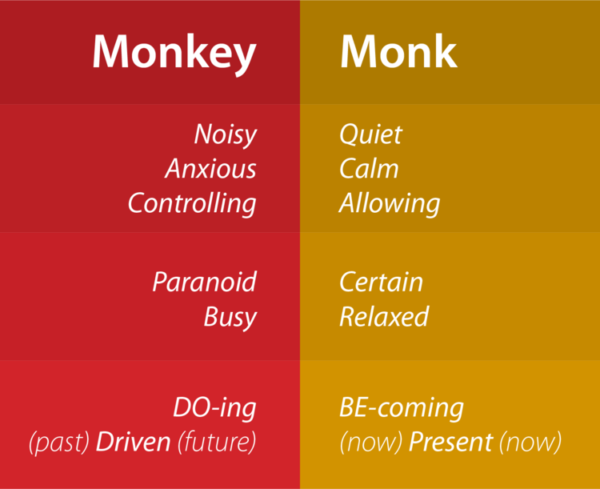
Monkey Mind to Mindfulness
According to Buddhist principles, the “monkey mind” is a term that refers to being unsettled, restless, or confused. … It is also the part of your brain that becomes easily distracted, so if you want to get anything done in life, your challenge will be to shut down the monkey mind.
Do you ever find yourself jumpy, anxious, and overwhelmed with a million thoughts racing through your head?
Is the feeling so overpowering that you become paralyzed and unable to take action?
THE MONKEY MIND
The origins of the monkey mind date back to the Buddha. The expression is used to describe the inability to quiet our mind when there are many thoughts, ideas, and worries swirling around in our head.
Our tendency to multi-task and our addiction to technology exacerbates the problem.
SYMPTOMS
Some symptoms of the monkey mind include inability to sleep, exhaustion (maybe due to lack of sleep), memory issues, and inability to focus. Now that we’ve identified the problem and the symptoms, what can be done?
THREE WAYS TO TAME THE MONKEY MIND
By practicing these strategies on a daily basis, you can quiet the monkey mind:
1. MEDITATION:
Taking a few minutes each day to sit quietly or follow a guided meditation helps to quiet the mind.
There are many types and approaches to meditate. The main 2 are focusing on a thing – candle flame, breath… which trains your attention. And when your mind wanders, you bring it back to the flame/breath, again and again. So the practice isn’t actually sitting there with a blank mind—it’s bringing the focus back to its object repeatedly.
Alternatively, you can watch your thoughts non-judgmentally, acknowledge them, and then (theoretically) let them go. Rather than reacting to a thought, you just observe it curiously and then watch it subside.
This is where you might say, “But, there are a million thoughts flying through my head.” Exactly…that’s the monkey mind!
If you have tried meditating before and thought you were not doing it correctly because your mind wandered, give it another chance. Your mind is expected to wander and it in no way is an indication that you are doing it wrong.
Let the thoughts drift to the side, with no judgment, and bring yourself back to focusing on your breath. As you do this repeatedly, you strengthen your ability to focus.
Imagine how this can help you throughout the day when you are trying to concentrate and other thoughts fly into your head. If you have trouble meditating on your own, try a guided meditation. There are lots of apps available like ‘Calm’ and ‘Insight Timer’ which offer guided meditations.
2. MINDFULNESS
Do you ever find that when you are in a meeting or waiting in line at the supermarket your mind starts wandering to (and stressing over) what you have to do later that day?
We have all been there. You have so much to do before leaving the office…when will this meeting end?! E-mails, phone calls, quarterly reports, texts…
Or, perhaps you are still stewing because the barista in Cafe got your coffee order wrong this morning. Seriously?! You go to the same Cafe every day…how hard is it to get a simple coffee order right?
Either way, you are contaminating the time you are in. Your participation in the meeting is marginalized because you are not focused on the content when you are busy worrying about other things. The monkey mind has taken over again!
Wherever you are, be totally present and try to only focus on what is being discussed. This conscious state of being is mindfulness.
3. ATTITUDE OF GRATITUDE
According to research, repeated thoughts create neural pathways. The more you identify positive things in your life, the deeper and more pronounced those pathways become.
Consider keeping a gratitude journal. At the end of each day, write three things for which you are grateful. It can be something simple like the sunshine, a flower blooming, a nice conversation, connecting with someone, completing a task…
Over time, this daily practice trains your brain to look for the positive in things…it becomes a reflex. So, even if you feel like you were born or raised a pessimist, you can start to see your cup as being half full and even overflowing.
SUMMARY
The combined daily practice of meditation, mindfulness, and gratitude brings a sense of peace and order, keeping the monkey mind at bay. The more you practice, the greater your ability to focus and react calmly in stressful situations.
As Ram Dass said, “When you meet a being who is centered, you always know it. You always feel a kind of calm, emanation. It always touches you in that place where you feel calm.”




